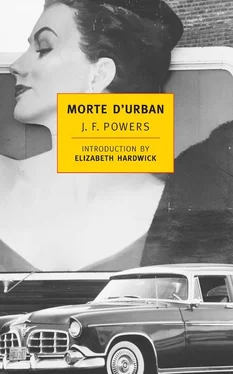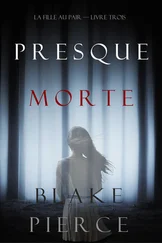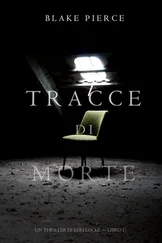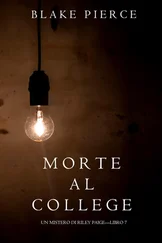“There’s one other, but Johnny can handle that one.”
Father Urban thought this odder still. Why shouldn’t one man make the rounds? “What’s the name here?” he asked, when they turned into a private road. The big iron gates were open.
“Thwaites.”
“Not our benefactress?”
“Yes.”
“Your parishioner?”
“Yes.”
“What’s she like?”
“You’ll see.”
When Father Urban saw the house, which was approached through wooded grounds, he thought of Major. They were admitted by a rosy-cheeked girl whom Phil introduced only as Katie. Her heavy gray sweater reminded Father Urban of the one he wore when he was at the Hill, and suggested that the house wasn’t being heated all over. They kept their coats on, and went upstairs.
In a room much larger than any bedroom at the Hill, Mrs Thwaites sat in an overstuffed wheelchair, watching television on two sets. The only light in the room came from the sets, a dead light, so that Mrs Thwaites’s face showed up like a photographic negative: a little old woman with the face of a baby bird, all eyes and beak, but with a full head of bobbed white hair. One hand was wrapped in black rosary beads the size of cranberries, and the other gripped the remote control. A humidifier steamed at her feet. To one side of her chair there was a table with dominoes stacked on it. Across the room, an elevator, door open, was waiting. In one corner, a big bed, fancier than Wilf’s and higher off the floor, was also waiting. The shades were drawn in all the windows, and the temperature was equatorial.
Mrs Thwaites cut the jabber that had been coming from one of the sets, but did not invite them to sit down. The pictures went on — a giveaway program and a panel show, with contestants on both wearing paper hats — while Phil introduced Father Urban to Mrs Thwaites.
“So Father Chumley won’t be coming,” Phil said.
“No, I don’t want him .”
“That’s all taken care of, Mrs Thwaites. Father Urban, here, will be the one.”
“That’s right,” said Father Urban.
Mrs Thwaites, without giving him so much as a look, said, “Nine o’clock sharp.”
Well, old people were like that, Father Urban told himself. He did wish, though, that Phil had introduced him to Mrs Thwaites as a Clementine. That might have meant more to her.
“We’d better be running along,” Phil said.
Mrs Thwaites beckoned him over to her then, and asked for his blessing. She bowed her head slightly for it (but Father Urban could see that she was watching the sets), and, when it was over, she handed Phil an envelope. “Take care of yourself,” she said.
Father Urban, after opening the door for Phil, smiled at Mrs Thwaites and cried, “Happy New Year!” But he was too late.
Mrs Thwaites had turned up the sound.
On the way back to St Monica’s, Father Urban said, “What’s the wheelchair mean?”
“Old age.”
“She can walk then?”
“Yes.”
“What’s she got against Chumley?”
“The last time I was gone, they didn’t get along.”
“Oh?”
“No,” Phil said, but that was all.
“The girl — Irish, isn’t she?” Her “Good evening” had sounded like it to Father Urban.
“Yes.”
“Mrs. Thwaites brought her over?”
“Yes.”
“I shouldn’t think there’d be much for a girl in a place like that.”
“No.”
“But I suppose she’s well paid, or thinks she is anyway.”
“I suppose.”
“The old woman — she likes her television.”
“Yes.”
Back at St Monica’s, in the upper room, while Phil was down getting ice cubes, Father Urban engaged Monsignor Renton on the subject of Mrs Thwaites and did better.
“If we had another channel up here, she’d have another set,” Monsignor Renton said. “She doesn’t want to miss anything. Tonight she’ll ring out the old, and ring in the new, in all the time zones. I wonder — do they go on to Honolulu?”
“Not on television. What’s she got against Chumley?”
“She worries about the next world, and questions every priest she meets. Johnny Chumley told her, ‘You are what you eat’—she was on black molasses at the time—‘and will be what you are.’ Sound doctrine.”
“Yes, but it takes some explaining.”
“She was out of the Church for a time, did you know?”
“As a matter of fact, I didn’t.”
“Oh yes. When she married Andrew she left the Church. That was part of the deal. That was Andrew’s great work in life — making apostates. And making money.”
“Lumber?”
“While it lasted, and then pumps. Hydraulic pumps. Government contracts. Here and abroad. Foreign capital built the railroads in this part of the country, did you know?”
“I don’t know whether I did or not. She came back in when he died?”
“Yes, and she’s been making up for lost time ever since. That’s where you guys come in. My guess is she wanted to take the curse off the old place. Maybe there was a tax angle, too, a write-off of some kind. That’s how her mind works. She hasn’t done anything else for you, has she?”
“No.” From Wilf, Father Urban had understood that there were surviving heirs, but he preferred to start from scratch with Monsignor Renton. “Any children?”
“A boy and a girl. The boy — hell, he must be almost as old as you are. The boy’s been in and out of religious orders for years. As a brother. When he’s out, as I believe he is at the moment, he’s a professional layman, if you know what I mean.”
“And the girl?”
“Sally’s out of the Church, but I’d say she’s the best of the lot — a bad lot.”
“Andrew was the son of the man who did away with his wife…”
“His wife and another, and then himself. The other man — just a lumberjack — was a French Canadian. Catholic. In my opinion, that’s what made Andrew such a son-of-a-bitch. Ah, well.”
After a moment, Father Urban said, “Still, she is back in the Church.”
“I’m told she was a looker in her day. Otherwise, I don’t think she’s changed much.”
“Still, she must have changed some.”
“It all goes together. The television sets, the bomb shelter, and the religion.”
“Bomb shelter?”
“You saw the elevator?”
Father Urban nodded.
“Takes her down to it.”
Father Urban felt that Monsignor Renton was probably right about Mrs Thwaites — up to a point. After that, there was no knowing, and, in any case… “Who are we to judge her?” he said. “What if she is only motivated by old age and fear of the Lord? That’s enough, thank God. It takes all kinds to make the Church.”
“God is not mocked.”
“The woman’s a daily communicant. That should count for something.”
“God is not mocked.”
“No, but…”
No, but and Yes, but and On the other hand and Much as I agree with you , and Apart from that and Far be it from me —Father Urban, it seemed, was always trying to present the other side, the balanced view. This kept him busy, for Monsignor Renton talked like a drunken curate. One moment it was “God is not mocked” or “Christ, and Christ crucified,” and the next moment it was “Your ass is out.”
Nevertheless, they were kindred souls, at one on fundamentals, and sharing many preferences and prejudices — until the conversation moved into a certain area. This was a very large area, easily arrived at, and here they were like the blind men in the fable who, touching the elephant’s body here and there, could not agree about it. The elephant, in the case of the blind men in the upper room, was their vocation. Much of the secondary activity sponsored, and sometimes even participated in, by the clergy left Father Urban cold, and Monsignor Renton said some things about the various “movements” within the Church that badly needed saying. “Yes, but don’t throw the baby out with the bath water,” said Father Urban, when he felt the cold current in Monsignor Renton’s thought. Father Urban’s good work over the years, as a preacher and as a person but always as a priest, would count for little if, as Monsignor Renton said, any time not spent at the altar, or in administering the sacraments, was just time wasted for a priest. (“That’s why I took up golf.”)
Читать дальше











